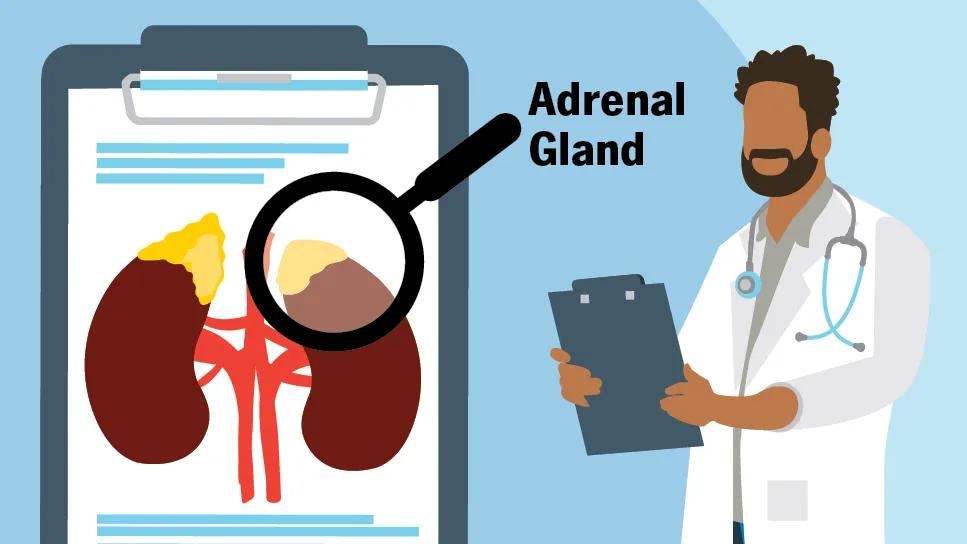While it’s not medically recognized that our adrenal glands can ‘tire out,’ adrenal disorders are a very real thing

It’s no surprise that stress can cause many health issues. But can it get so bad that it “tires out” your adrenal glands? You may have heard that “adrenal fatigue” is the cause of your excessive fatigue, sleeping problems and trouble concentrating.
Advertisement
Cleveland Clinic is a non-profit academic medical center. Advertising on our site helps support our mission. We do not endorse non-Cleveland Clinic products or services. Policy
But the problem with the term “adrenal fatigue” is that it’s not an officially recognized diagnosis. Rather, it’s just used to describe a group of symptoms when nothing else can explain them.
We get it. Feeling fatigued and not knowing why it’s happening can be exhausting (in more ways than one). But it’s better to know exactly what’s going on so it can be treated properly.
Endocrinologist Pratibha Rao, MD, MPH, discusses the truth about “adrenal fatigue” and how a proper diagnosis and comprehensive care can lead to symptom relief.
Our adrenal glands play a big role in how our body works. Just like your heart and lungs, they have a huge functional capacity. “Adrenal fatigue” is a term used to explain feelings of tiredness, fatigue, body aches and sleep disturbances that happen when our adrenal glands get overwhelmed by stress.
While adrenal glands are tied to our stress hormones, the term is misleading.
“The adrenal glands do have a big job,” Dr. Rao reiterates. “They’re responsible for producing, secreting and regulating specific hormones in your body, including cortisol.”
But the idea of “adrenal fatigue” is based on the assumption that your adrenal glands have the capacity to get tired. But this doesn’t actually happen. “They don’t simply tire out,” she states.
Advertisement
In reality, your symptoms could point to a separate issue that should be handled differently. For instance, you may be experiencing an actual adrenal disorder (more on that in a moment) or something else entirely.
“Often, someone who believes they have adrenal fatigue may have postural orthostatic tachycardia syndrome (POTS), a surprisingly common condition,” Dr. Rao points out. “You may also have other underlying illnesses, making a thorough workup with your primary care team a vital part of your care plan.”
Unfortunately, adrenal fatigue doesn’t truly explain what’s going on in your body, which, again, can lead to misdiagnosis, mistreatment and unpleasant side effects. In addition, a diagnosis of adrenal fatigue can potentially mask something else going on in your body — something that should be further explored with your care team.
For example, if you’ve been misdiagnosed with an adrenal disorder, you may get prescribed prednisone (a type of steroid) or advised to purchase expensive adrenal supplements to replace the cortisol that’s presumed to be missing.
“But there are no benefits from taking these medications — and in fact, taking prednisone or any other steroids when you do not need it can result in negative side effects and could ultimately suppress your body’s own ability to produce cortisol,” warns Dr. Rao.
While your symptoms may not be explained by adrenal fatigue, they could point to a specific adrenal gland issue.
Some symptoms could include:
Adrenal insufficiency happens when your adrenal glands don’t function properly and can’t release the vital hormones your body needs to function normally. The exact cause of adrenal disorders isn’t known, so it can be hard to pinpoint why it happens.
The term “adrenal fatigue” refers to a theory that stress can affect the adrenal glands when it can’t keep up with cortisol levels. But it’s not an accepted diagnosis.
Certain risk factors can play a role in adrenal disorders, like:
When these things happen, it can lead to problems like Addison’s disease (when your adrenal glands don’t make enough hormones) or Cushing syndrome (when they make too much cortisol). Adrenal disorders can cause a bunch of different symptoms, like feeling tired all the time, changes in weight and changes in blood pressure.
Advertisement
If it turns out there’s a problem with your adrenal glands, there are steps you can take to help. The best way to do that is to talk to a healthcare provider so you can get an accurate diagnosis.
“Sometimes, we can help you immediately by making modifications to your diet, prescribing an exercise routine and/or recommending specific supplements,” Dr. Rao shares.
To assess adrenal function, your healthcare provider will conduct a one-hour ACTH stimulation test, which is a reliable way to test if your adrenal glands can make enough cortisol. They’ll likely also look for thyroid issues and diabetes.
After ruling out possible endocrine disorders, your endocrinologist can refer you to other specialists, including urologists, cardiologists, rheumatologists, allergists/immunologists and infectious disease physicians.
If you’re diagnosed with POTS or another disorder, these specialists will work together to manage your health and develop a targeted treatment plan — putting you on the path to symptom relief.
If you think the symptoms you’re experiencing are tied to your adrenal glands, the best way to find answers is to talk to a healthcare provider. It can be difficult not knowing why you feel a certain way, but an accurate diagnosis is the first step to get you feeling better.
Advertisement
Advertisement
Learn more about our editorial process.
Advertisement

Hormonal imbalances can make it harder to conceive when you’re living with CAH, but treatments are available

Hoping to combat stress and fatigue? These trendy ’mocktails’ aren’t your best choice

Pack extra medication and supplies, bring healthy snacks and set reminders

Many chronic conditions can cause fatigue — but don’t overlook mental health concerns, iron level and hormones

Some osteoporosis medications help slow bone breakdown, while others help grow new bone — what’s best for you depends on your needs

Hypothyroidism is underactivity of your thyroid gland, while hyperthyroidism is overactivity — but both conditions need treatment

You can release serotonin, oxytocin, dopamine and endorphins by cooking a meal, walking outside, petting your dog and more

Background stimulation and intentional fidgeting may actually help you stay on task

If you’re feeling short of breath, sleep can be tough — propping yourself up or sleeping on your side may help

If you fear the unknown or find yourself needing reassurance often, you may identify with this attachment style

If you’re looking to boost your gut health, it’s better to get fiber from whole foods